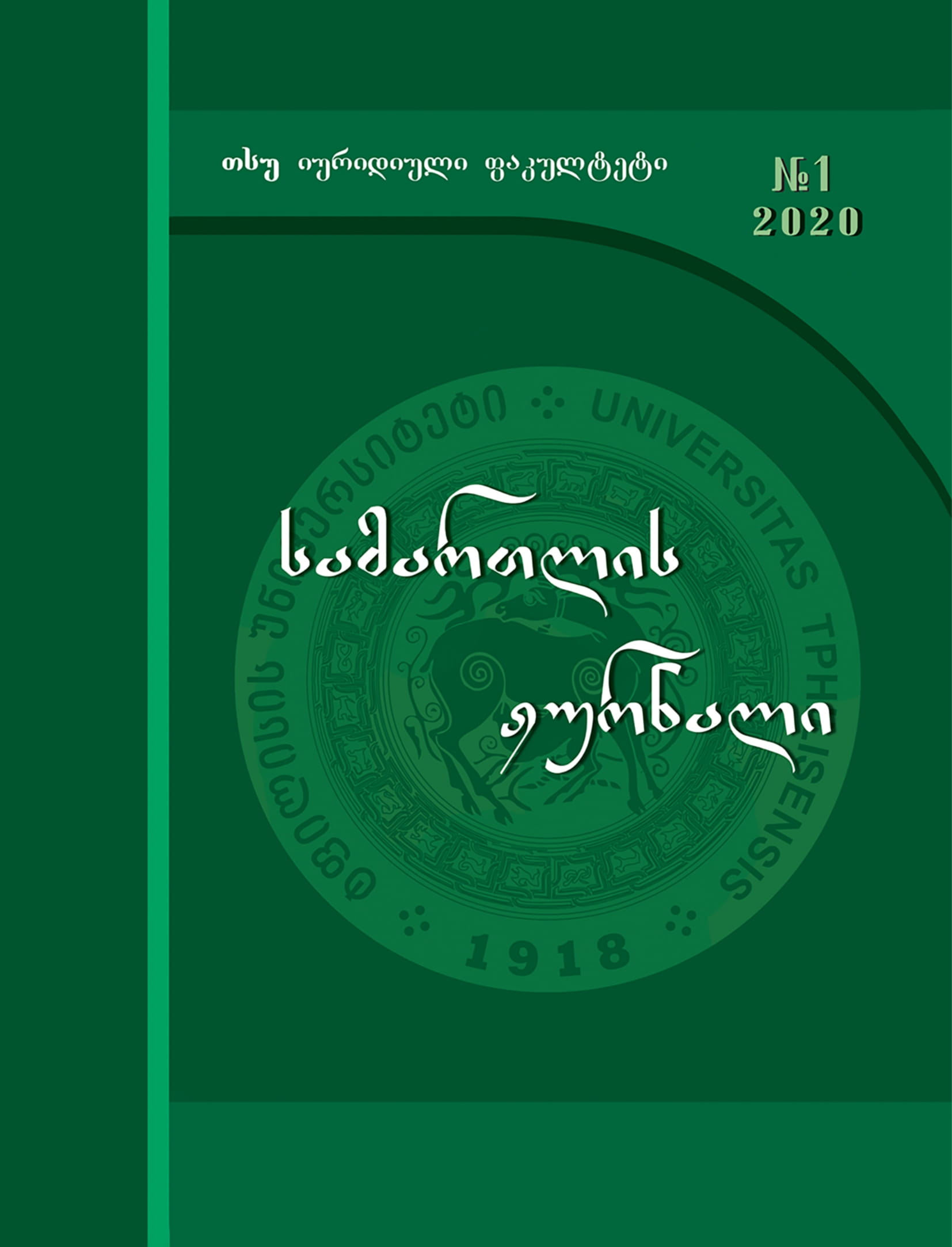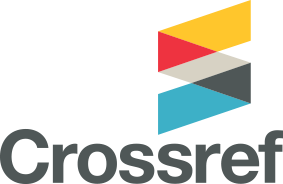ელექტრონული კომერციის სამართლებრივი განვითარების პერსპექტივები საქართველოში ევროკავშირთან ასოცირების ხელშეკრულების ფარგლებში
საკვანძო სიტყვები:
ევროპეიზაცია, ელექტრონული კომერცია, განვითარებადი ქვეყნები, აღმოსავლეთ პარტნიორობა, ასოცირების ხელშეკრულება, GATS, GATT.ანოტაცია
ტექნოლოგიური სისტემების რევოლუციური განვითარება დიდ ზეგავლენას ახდენს ვაჭრობის ტრადიციულ ფორმებზე. დღევანდელ რეალობაში მნიშვნელოვნად მატულობს ელექტრონული კომერციის წილი, რომელიც ინტერნეტზე დაფუძნებული სავაჭრო სტრუქტურით ხასიათდება და ეკონომიკური თვალსაზრისით სამეწარმეო საქმიანობის გაუმჯობესების მარტივ და ეფექტიან გზას გვთავაზობს. ბიზნესის ოპერირების აღნიშნული ფორმის სიმარტივე და ეფექტიანობა გამოხატულია ნაკლებ ოპერაციულ დანახარჯებში, მსოფლიო ბაზარზე შეუზღუდავ წვდომასა და გაზრდილ პროდუქტიულობაში. ელექტრონული კომერციის უპირატესობები განსაკუთრებით თვალსაჩინო კოვიდ-19-ის პანდემიის პირობებში ხდება. საგანგებო მდგომარეობაში მთავრობები ეკონომიკური კრიზისის თავიდან აცილებას სწორედ ონლაინ პლატფორმების საშუალებით ახერხებენ.
შესაბამისად, დღეს ელექტრონული კომერცია სულ უფრო და უფრო მიმზიდველია. მაშინ, როცა შექმნილი ვითარება უბიძგებს კერძო სექტორს, სტარტაპებსა და მომხმარებლებს უკუაგდონ ტრადიციული კომერციის მოდელები, საკანონმდებლო თვალსაზრისით მისი რეგულირება რიგ გამოწვევებთან არის დაკავშირებული. მათგან, პირველ ყოვლისა, აღსანიშნავია ტექნოლოგიების სწრაფი ცვალებადობა, რეგულირების გამოცდილების ნაკლებობა და მზარდი სერვიტიზაცია, რომელშიც, გარდა ჩვეულებისამებრ მომსახურების გაწევისა, ტრადიციული პროდუქტების გამოწერის ბიზნეს ფორმებიც იგულისხმება. თუმცა, აღსანიშნავია, რომ განვითარებული სახელმწიფოები ელექტრონული კომერციის სამართლებრივ ჩარჩოს შექმნაში უფრო წარმატებულები არიან, ვიდრე ― განვითარებადი ქვეყნები. აწყდებიან რა სამართლებრივ ხარვეზებს ბევრი მიმართულებით, მათთვის გამოწვევების ჩამონათვალიც გაცილებით ფართოა.
წინამდებარე ნაშრომი, პირველ ყოვლისა, ონლაინ ბიზნეს მოდელების ანალიზის საფუძველზე ელექტრონული კომერციის ეკონომიკური და სამართლებრივი განვითარების ტენდენციებს წარმოაჩენს. ვინაიდან, ავტორის მტკიცებით, ელექტრონული ვაჭრობა „მესამე სამყაროს“[1] მიკრო და მაკრო ეკონომიკური განვითარების ხელშემყობი უპირობო ფაქტორია, მიზანშეწონილია მისი დაბალანსებული რეგულირება. ამიტომ, ნაშრომში განსაკუთრებული აქცენტი ელექტრონული ვაჭრობისთვის რელევანტურ შიდა და საერთაშორისო ნორმატიული ბაზის მიმოხილვას დაეთმობა. ევროკავშირსა და საქართველოს შორის გაფორმებული ასოცირების ხელშეკრულების საფუძველზე სტატია ყურადღებას გაამახვილებს იმ ვალდებულებებზე, რომლებიც საქართველოს ევროპეიზაციის პირობებში აქვს ელექტრონული კომერციის ხელშეწყობის მიზნით შესასრულებელი.
წყაროები
Constitution of Georgia, Parliamentary Gazette, 31-33, 25/08/1995.
Council Directive 1999/93/EC of 13 December 1999 on a Community framework for electronic signatures [1999] OJ L 013 19/01/2000.
Council Directive 2000/31/EC of 8 June 2000 on certain legal aspects of information society services, [2000] OJ L 178 17/7/2000.
Council Directive 2007/64/EC of 13 November 2007 on payment services in the internal market amending Directives 97/7/EC, 2002/65/EC, 2005/60/EC and 2006/48/EC and repealing Directive 97/5/EC, [2007] OJ L 319, 5/12/2007.
Council Directive 2016/1164 of 12 July 2016 on laying down rules against tax avoidance practices that directly affect the functioning of the internal market, [2016] OJ L 193 19/7/2016.Eastern Partnership, Communication from the Commission to the European Parliament and to the Council, Brussels, 3/12/2008, COM (2008), 823 final, 13.
GATS: General Agreement on Trade in Services, Apr. 15, 1994, Marrakesh Agreement Establishing the World Trade Organization, Annex 1B, 1869 U.N.T.S. 183, 33 I.L.M. 1167, 1994.
GATT 1994: General Agreement on Tariffs and Trade 1994, Apr. 15, 1994, Marrakesh Agreement Establishing the World Trade Organization, Annex 1A, 1867 U.N.T.S. 187, 33 I.L.M. 1153, 1994.
Law of Georgia on Electronic Documents and Electronic Trust Services, LHG, № 639-IIS, 21/04/2017.
Law of Georgia on International Treaties, Parliamentary Gazette, 44, 16/10/1997;
Law of Georgia on Normative Acts, LHG, № 33, 22/10/2009;
The Association Agreement between the European Union and the European Atomic Energy Community and their Member States, of the one part, and Georgia, of the other part, 01/07/2016.
UNCITRAL Model Law on Electronic Commerce 1996 with additional article 5 bis as adopted in 1998.
UNCITRAL Model Law on electronic signatures, 2000.
United Nations, Provisional Central Product Classification, 1991.
WTO Agreement: Marrakesh Agreement Establishing the World Trade Organization, Apr. 15, 1994, 1867 U.N.T.S. 154, 33 I.L.M. 1144, 1994.
WTO Council for Trade in Services, Work Program on Electronic Commerce: Progress Report to the General Council, adopted by the Council for Trade in Services on 19 July 1999, S/L/74, 27 July 1999, at para. 4.
WTO Declaration on Global Electronic Commerce, WT/MIN (98)/DEC/2, [1998].
WTO Guidelines for the Scheduling of Specific Commitments Under the GATS, Adopted by the Council for Trade in Services S/L/92, 2001, 41-49.
WTO Secretariat highlights potential trade gains from electronic commerce, See WTO Declaration on Global Economic Commerce, WT/MIN 02/12/1998.
WTO Work Programme on Electronic Commerce, WT/ L/274, 01/03/1998.
WTO, Annex on Telecommunications, in General Agreement on Trade in Services, [1994], Marrakesh Agreement Establishing the World Trade Organization, Annex 1B, The Legal Texts: The Results of The Uruguay Round of Multilateral Trade Negotiations 284, 1999, 1869 U.N.T.S. 183, 33 I.L.M. 1167, 1994.
WTO, Negotiating Group on Basic Telecommunications, Telecommunications Services: Reference 24/04/1996.
Abuladze R., Gigauri I., Ecosystem of Digital Economy in Georgia, Tbilisi, 2017, 5-9 (in Georgian).
Alyoubi A. A., E-commerce in Developing Countries and How to Develop Them During the Introduction of Modern Systems, 65 ICCMIT, 2015, 479.
Andguladze A., Digital Economy: New Opportunity for a Greater Integration with European Union, ISFED, 2007, 1 (in Georgian).
Andguladze A., Digital Economy: New Opportunity for a Greater Integration with European Union, ISFED, Tbilisi, 2017, 5.
Bernardes E. S., The Socio-Economic Impacts of E-commerce: A review of Understanding the Digital Economy, in: Brynjolfsson E., Kahin B. (Ed.), Data, tools, and research, Cambridge, MA: MIT Press, 2000.
Bhagavan M. R., Technological Leapfrogging by Developing Countries, Encyclopedia of Life Support Systems, Reddy P. (Ed.), Globalization of Technology, EOLSS Publishers Co Ltd., Research Policy Institute, Lund University, Sweden, 2009.
Bieron B., Usman A., Regulating E-commerce through International Policy: Understanding the International Trade Law Issues of E-commerce, 46 (3) Journal of World Trade, 2012, 545-549.
Capisizu L. A., EU acquis on E-commerce, Challenges of the Knowledge Society, Internetul, Bucureşti: Prietenii Cartii, 2008, 379-380.
Chander A., Exporting DMCA Lockouts, 54 Clev. St. L. Rev. 205, 2006, 212.
Cirstea A., Implications of Electronic Commerce Law in Romania, 3 (1), Perspectives of Business Law Journal, 2014, 139-140.
Eichengreen B., Globalizing Capital: A History of the International Monetary System, Second edition, Princeton University Press, 1996.
Emerson M., Cenușa D. (Eds.), Deepening EU-Moldovan Relations What Why and how? Second edition, Centre for European Policy Studies, Rowman & Littlefield International, 2016, Brussels, 31, 84.
Featherstone K., Radaelli C., The Politics of Europeanization, Oxford University Press, 2006, 27.
Felicity G., Berova N., The Rule of Online Law: Treating Data Like the Sale of Goods: Lessons for the Internet from OECD and CSIG and Sacking Google as the Regulator, 30 Computer Law and Security Review, 2014, 473.
Gangopadhyay A., Managing Business with Electronic Commerce: Issues and Trends, Baltimore, Maryland, USA, 2001.
Gao H., Regulation of Digital Trade in US Free Trade Agreements: From Trade Regulation to Digital Regulation, 45 (1) Legal Issues of Economic Integration, 2018, 50.
Gershuny J., Changing Times. Work and Leisure in Postindustrial Society, Oxford University Press, 2000, 1.
Gupta J. N. D., Sharma S. K., Cyber Shopping and Privacy, Ball State University, USA, 2001, 235-249.
Gylfason Th., Artínez-Zarzoso I., Magnus Wijkman P., Free Trade Agreements, Institutions and The Exports of Eastern Partnership Countries, 53 JCMS, 2015, 1215.
Ho S., Kauffman J. R., Liang T., Internet-based Selling Technology and E-commerce Growth: A Hybrid Growth Theory Approach with Cross-model Inference, 12 Inf Technol Manag, 2010, 409-429.
Kelsey J., How a TPP-Style E-commerce Outcome in the WTO would Endanger the Development Dimension of the GATS Acquis (and Potentially the WTO), 21 Journal of International Economic Law, 2018, 274-277.
Kennedy M. D., Key Legal Concerns in E-Commerce: The Law Comes to the New Frontier, 18 T.M. Cooley L. Rev. 2001, 18-19.
Mansel R., Digital Opportunities and The Missing Link for Developing Countries, 17 (2) Oxford Review of Economic Policy, 2001, 284.
Marzangou A., Ghorbani M., Vandi S. R., Khodami S., Saadati S., Aminian M., E-commerce in a Digital Economy, the Challenges and Advantages, 4 International J. Soc. Sci. & Education, 2014, 6.
Molla A., Heeks R., Exploring E-Commerce Benefits for Businesses in a Developing Country, 23 (2) The Information Society, 2007, 95-108.
Nirmal B. C., Singh R. K., Contemporary Issues in International Law, Springer Singapore, 2018, 22.
Nuray T., The Impact of E-commerce on International Trade and Employment, 24 Procedia Social and Behavioral Sciences, 2011.
Panagariya A., E-Commerce, WTO and Developing Countries, 2 Policy Issues in International Trade and Commodities Study Series, Geneva, 2000, 3.
Pappas W. C., Comparative U.S. and EU Approaches to E-Commerce Regulation: Jurisdiction, Electronic Contracts, Electronic Signatures and Taxation, 31 Denv. J. Int'l L. & Pol'y, 2002.
Reidenberg J. R., E-Commerce and Trans-Atlantic Privacy, 38 Hous. L. Rev., 2001, 717-718.
Rostow W. W. (Ed.), The Stages of Economic Growth, Cambridge University Press, 1962.
Samkharadze I., Europeanization of Georgia: The Key Legal Aspects of EU Membership, 5 J. Justice and Law, 2015, 41.
Samuelson P. A., International Trade and the Equalization of Factor Prices, LVIII Economic Journal, 1948 163-184.
Slavko D., Electronic commerce, 4 (2) Economics, 2016, 3.
Steinmueller W. E., Possibilities of Leapfrogging to Higher Value-Added Production for Developing Countries as a Result of New Information and Communication Technologies, 140 (2) International Labour Review, 2001.
Trimble M., Geo-blocking, Technical Standards and the Law, Scholarly Works Paper 947, 2016, 55.
Verdun A., Chira G., The Eastern Partnership: The Burial Ground of Enlargement Hopes? 9 (4) Comparative European Politics, United Kingdom, 2011, 448–466.
Weber H. R., International E-Trade, 41 Intl. L. 51, 2007, 845.
Willemyns I., The GATS (in)consistency of Barriers to Digital Services Trade, European Society of International Law (ESIL) Conference, UK, 2018, 4.
Shaping the Digital Single Market, https://ec.europa.eu/digital-single-market/en/policies/shaping-digital-single-market#Moredocuments [05.05.2020].
Eastern Partnership, https://eeas.europa.eu/diplomatic-network/eastern-partnership/419/eastern-partnership_en [ 05.05.2020].
Harmonisation of the Digital Markets in the Eastern Partnership, Study Report, 2015, https://europa.eu/capacity4dev/hiqstep/document/harmonisation-digital-markets-eastern-partnership-study-report [05/05/2020].
Khurana A., Advantages and Disadvantages of E-commerce, 2018, https://www.thebalancesmb.com/ecommerce-pros-and-cons-1141609 [20.04.2020].
Legal Issues with Regard to Business Operations and Investment in Ukraine, OECD Policy Brief, 2004 https://www.oecd.org/countries/ukraine/34514482.pdf0 [05.05.2020].
Magaziner I. C., Creating a Framework for Global Electronic Commerce, 1997, http://www.pff.org/issues-pubs/futureinsights/fi6.1globaleconomiccommerce.html[05.05.2020].
Moldova E-commerce,https://www.export.gov/article?id=Moldova-eCommerce[13.04.2020].
National Statistics Office of Georgia, http://www.geostat.ge/?action=page&p_id=2290&lang=geo [01.04.2020] (in Georgian).
New EU Rules on E-commerce, https://ec.europa.eu/digital-single-market/en/new-eu-rules-e-commerce [05.05.2020].
Rowley K. A., Meanwhile, on the UNCITRAL Front, Commercial Law, 2010, http://ucclaw.blogspot.com/2010/06/meanwhile-on-uncitral-front.html [05.05.2020].
The Digital 2 Dozen, Office of the United States Trade Representative, https://ustr.gov/about-us/policy-offices/press-office/reports-and-publications/2016/digital-2-dozen[05.05.2020].
The European Union External Action, 'Eastern Partnership (EaP), https://eeas.europa.eu/diplomatic-network/eastern-partnership/419/eastern-partnership_en[07.05.2020].
Ukraine Enacts E-Commerce Law, Legalizes E-Contracts, https://www.bna.com/ukraine-enacts-n57982059078/ [05.05.2020].
ჩამოტვირთვები
გამოქვეყნებული
როგორ უნდა ციტირება
გამოცემა
სექცია
ლიცენზია

ეს ნამუშევარი ლიცენზირებულია Creative Commons Attribution-ShareAlike 4.0 საერთაშორისო ლიცენზიით .









